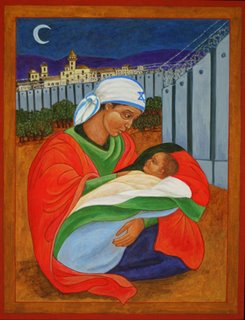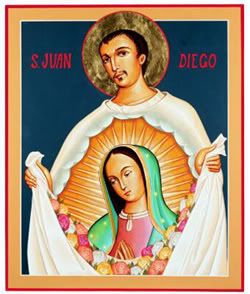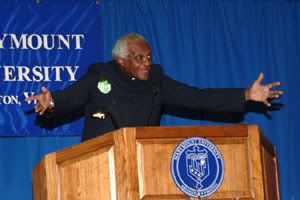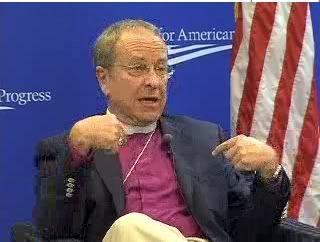Holy Mother...Loving Father... Source of All That Is... Oh--You know who You are! That daughter You gave me said a funny thing yesterday: "It seems like God has gotten shy over the years" (Meaning You don't talk to people like in the "old days") I said I wasn't sure that was true-- that sometimes it just doesn't get written down Sometimes people aren't sure it's really You (Or are afraid to believe that it is) And I told her of the time I heard from you (or one of Your "people") "Help heal the world" were the words I heard while lying in bed early that morning And then You held me close Maybe I imagined that, but it didn't matter The words felt real enough, and the need for healing was real, so I promised that I would Later I learned about tikkun olam, the Hebrew phase which translates to "repairing the world" That confirmed the notion that the call to help heal the world was true and real... It's also impossible There can never be enough glue, tape, bandages, needles and thread, hammers and nails, hope, patience, and love, to get the job done I suppose that's why the baptismal vows say, "I will, with God's help" So as we begin a new year, I ask again for Your help Help me to find the strength, energy, and love to keep working to mend that which is broken, both in myself and in the world You entrusted to our care. Alternate link for comments |
Sunday, December 31, 2006
A prayer for the new year
Posted by
Renee in Ohio
at
9:21 AM
|
![]()
Friday, December 29, 2006
On Poverty
I strongly recommend reading Christy Hardin Smith's post Bringing Poverty to the Table. Yes, as I suspected, the post was prompted by Edwards' announcement yesterday. But even if you support a different candidate, please read. As Christy noted at the end of the piece: That it has taken a Presidential candidate standing up and talking about this issue to get it back on the front pages of newspapers — at least for the day yesterday — is unconscionable. But at least people are talking about it again, and for that I applaud John Edwards for sticking to a topic that all of us need to be talking about much more frequently.I don't have a candidate to support yet, as Gore still seems unwilling to run, Feingold has said he won't, and Howard Dean is a man of his word, who promised not to run if elected chair of the DNC. But poverty is one of those uncomfortable, dauntingly big and complex issues that tends to get swept under the rug by the majority. Maybe it's a bit like global warming in that respect. Hurricanes Katrina and Rita were graphic examples of the urgency of both issues--we can't afford to ignore either. So I will join Christy in applauding Edwards getting poverty back into the headlines, even for one day. But I hope it will be for longer than that. Hopefully other candidates and officeholders will join him. And I don't say this as a supporter of any political candidate. I say it as a human being. I also say it as an Episcopalian who is proud of my new Presiding Bishop who insists on keeping the focus on this issue, in spite of the efforts of others to shift the attention back to issues of human sexuality. From an interview in June of 2006: Bishop JEFFERTS SCHORI: We need to be examining the poverty that is real around the world. We need to be examining the fact that our brothers and sisters, Anglican and not, in places like Africa and Asia don't have enough to eat. Their children don't have the opportunity to go to school. AIDS and tuberculosis and malaria are rampant in many parts of this world and people with those diseases don't have access to adequate health care. That's where our focus needs to be. And, from a description of Katharine Jefferts Schori's book, scheduled to be released in January... Grounding her reflections in a theology of the reign of God—‘God’s dream for creation’—she dares to ‘dream big’ herself, casting a vision of a world without poverty and hunger, where we all recognize our interdependence with every other child of God.Jefferts Schori's book can be preordered here. And I have heard those words echoed by Bishop Gene Robinson, and by Archbishop Desmond Tutu, and by many other people I respect and admire. I hope that more and more people will talk about it--especially people who have an audience. And when people try to distract us with something shiny, I hope that we will redirect, and bring the discussion back to issues of vital importance for our human family. (Also posted at Daily Kos, My Left Wing and Street Prophets) Update: I just discovered that Part II of Christy's discussion of poverty is now posted at FDL. Alternate link for comments |
Posted by
Renee in Ohio
at
1:39 PM
|
![]()
Tuesday, December 26, 2006
Oplatki
Here's a required part of Christmas when celebrated with my Mom's family: One of the most beautiful and most revered Polish customs is the breaking of the oplatek. The use of the Christmas wafer (oplatek) is not only by native Poles in Poland but also by people of Polish ancestry all over the world. Family members extend oplatki (plural--oplatek is the singular) to one another, and break pieces off, offering good wishes and blessings for the coming year. Every year we know that Oplatki Time is coming. It's awkward--like knowing you will be required to give a mini-speech to people you haven't seen since last year. Every year someone jokes about not doing it, or tries to barter it down to just holding up the wafers and making one big communal Christmas wish/blessing. But we always do the thing. It's tradition, dang it. Thank you to everyone who contributed to Heifer in my Mom's honor. She was really surprised, and quite touched. Will share more later, but now it's family time. |
Posted by
Renee in Ohio
at
11:04 AM
|
![]()
Friday, December 22, 2006
Countering Anti-Muslim bigotry
Note: I started this post at the beginning of the month and then got very busy with Christmas preparations and various events for the kids. But today, after more recent developments, such as Virginia Represenative Virgil Goode's letter about the importance of tightening immigration restrictions to avoid an "influx of Muslims", I decided I'd better post it. A video of news segment about this story can be seen at Crooks and Liars. Here is a link to some columns by Dr. Asma Mobin Uddin, a Columbus area pediatrician and member of the Muslim faith. She makes public appearances (one at my church a couple years ago) to help people learn more about the misunderstood and sometimes mistrusted faith to which she belongs, has written columns for the Faith and Values section of the Columbus Dispatch, and has written a children's book, My Name is Bilal... Synopsis:Alternate link for comments |
Posted by
Renee in Ohio
at
3:14 PM
|
![]()
Thursday, December 21, 2006
What part of "all" don't these people understand?
Some disheartening stories I've seen recently... And, God says, God says, "Yes, I do have a dream. Like, Martin Luther King, Jr." God says, "I, too, have a dream. I dream that my children one day will discover that they are family."By the way, one way to help those family members who are living in hunger and poverty, is through a donation to Heifer International. I've set up a page, with a modest goal of $250, here. Alternate link for comments |
Posted by
Renee in Ohio
at
10:02 AM
|
![]()
Tuesday, December 19, 2006
Art, worship, and action
A U2charist is an Episcopal Eucharist service that features the music of the rock band U2 and a message about God's call to rally around the Millennium Development Goals. The U2charist is a great opportunity to reach out to the people in your congregation and larger community, especially young people. This service the music and message of U2 about global reconciliation, justice for the poor and oppressed, and the importance of caring for your neighbor. Led by the global MDG ambassador, Bono, U2 is calling people worldwide to a deeper faith and engagement with God's mission. The U2charist seeks to be an extension of this ministry. Who knows...maybe Jon can make up for this by having Bono, or, better yet, Bishop Katharine Jefferts Schori, on the program to talk about the Millennium Development Goals. (Why not--he had Bishop Desmond Tutu on the program!) Alternate link for comments |
Posted by
Renee in Ohio
at
10:29 AM
|
![]()
Tuesday, December 12, 2006
The "true on the inside" story of Our Lady of Guadalupe
...an elderly Indian man named Chuauhtlatoczin ["Juan Diego" in Spanish] had a vision of Mary, the mother of Jesus, at Tepeyac, a squalid Indian village outside of Mexico City. Mary directed Juan Diego to tell the bishop to build the church in Tepeyac. The Spanish Bishop, however, dismissed the Indian’s tale as mere superstition — he was, after all, an Indian — but then, to humor Juan Diego, he insisted that he bring some sort of proof, if he wanted to be taken seriously. So, three days later, the Virgin Mary appeared again and told Juan Diego to pick the exquisitely beautiful roses that had miraculously bloomed amidst December snows, and take them as a sign to the Bishop. When the Indian opened his poncho to present the roses to the Bishop, the flowers poured out from his poncho to reveal an image of the Virgin Mary painted on the inside of the poncho. That image hangs today in the Basilica of Guadalupe in Mexico City and is venerated by thousands of pilgrims from all over the world.While I was raised Catholic, I don't remember learning this story, or if I did, it didn't really register. Maybe that is because of the "otherness" of the characters involved. Mary of Nazarath, I now know, certainly was *not* blond and blue-eyed, but as a blond, blue-eyed child, that depiction seemed normal and familiar. I only came to really read and ponder the story as an adult, having been officially received into the Episcopal church, and felt very much at home in my new church. But it was lacked any iconography of Mary, so I turned to other sources to feed that longing. The writing of Kathleen Norris, in particular, helped me come to terms with the significance of Mary from a more modern, feminist perspective than I had encountered in the past, and also introduced me to the story of the Virgin of Guadalupe. Here is an excerpt of her writing on the subject: In a recent essay the writer Rugen Martinez lovingly articulates the paradoxes that enliven his sense of the officially sanctioned Mary of church doctrine, and, to borrow his phrase, the "Undocumented Virgin" of personal experience and legend, folktale, and myth. I should probably take this opportunity to make an aside and state that by "myth" I mean a story that you know must be true the first time you hear it. Or, in the words of a five-year-old child, as related by Gertrude Mueller Nelson in her recent Jungian interpretation of fairy tales and Marian theology, Here All Dwell Free, a myth is a story that isn't true on the outside, only on the inside.Juan Diego was declared a saint by Pope John Paul II back in 2002, and I recall hearing news stories that there were doubts about the authenticity of the potential saint's story. I remember easily accepting the notion that the story was "used" as something like a marketing strategy to help convert the native people to Catholicism. And that may indeed be part of the truth. But it's not all of it. Kathleen Norris writes: Mary's love and pity for her children seems to be what people treasure most about her, and what helps her to serve as a bridge between cultures. One great example of this took place in 1531, when the Virgin Mary appeared to an Indian peasant named Juan Diego on the mountain of Tepayac, in Mexico, leaving behind a cloak, a tilma, imprinted with her image. The image has been immortalized as Our Lady of Guadalupe, and Mexican-American theologian Virgilio Elizondo argues, in The Future is Mestizo, that the significance of this image today is that Mary appeared as a "mestiza," or person of mixed race, a symbol of the union of the indigenous Aztec and Spanish invader. What was, and still is, the scandal of miscegenation was given a holy face and name. As a Protestant I'll say it all sounds suspiciously biblical to me, recalling the scandal of the Incarnation itself, the mixing together of human and divine in a young, unmarried woman.I'm getting used to the idea that nothing is as black and white as it first appears--indeed, to welcome and expect that. Here is another meditation on the meaning of the Virgin of Guadalupe, from Social Edge. Will Braun writes, in part: As immigrant peoples in the Americas --or Turtle Island, as many indigenous people know it-- we live on ill-gotten land. Our homes and churches stand on land once home to others. Our spiritual histories must address this reality with honesty, grace, and compassion. Alternate link for comments |
Posted by
Renee in Ohio
at
12:44 PM
|
![]()
Monday, December 11, 2006
Robin Meyers' 2004 Peace March Speech
When I posted the link to Robin Meyers' book last night, it hadn't yet occurred to me that I had read his words before. But further searching reminded me that he had given a powerful speech at a peace rally in 2004, which was posted and/or referenced on a number of progressive blogs. It can be found as a PDF here. Christians take chances for peace. So do real Jews, and real Muslims, and real Hindus, and real Buddhists--so do all the faith traditions of the world at their heart believe one thing: life is precious.Robin Meyers is Senior Minister at Mayflower Congregational Church in Oklahoma City. |
Posted by
Renee in Ohio
at
11:21 AM
|
![]()
Sunday, December 10, 2006
Just heard about this book
...will have to check it out. "In the pulpit, Robin Meyers is the new generation's Harry Emerson Fosdick, George Buttrick, and Martin Luther King. In these pages, you will find a stirring message for our times, from a man who believes that God's love is universal, that the great Jewish prophets are as relevant now as in ancient times, and that the Jesus who drove the money changers from the Temple may yet inspire us to embrace justice and compassion as the soul of democracy. This is not a book for narrow sectarian minds; read it, and you will want to change the world." |
Posted by
Renee in Ohio
at
9:34 PM
|
![]()
Today is Human Rights Day
Today is UN Human Rights Day so it seems like an appropriate time to post the UN Millennium Development Goals: And, God says, God says, "Yes, I do have a dream. Like, Martin Luther King, Jr." God says, "I, too, have a dream. I dream that my children one day will discover that they are family." |
Posted by
Renee in Ohio
at
9:51 AM
|
![]()
Friday, December 08, 2006
Happy Bodhi Day
During our family's nightly Advent candle lighting, I'm making a point of talking about the other "holidays of light" that are celebrated in different faith traditions. I know very little about Bodhi Day, so if anyone has anything to add, please do... We should not think that this awakening is something that we must revere from afar. It is not that this Buddha is somehow set apart from us that makes him worth remembering. Instead, we should realize that the Buddha is important precisely because he was one of us, a human being who could and did wake up to a new vision of life and a new way of living in the world. What he did, we can do as well. The Flower Garland Sutra teaches that upon his awakening the Buddha thought, “I now see all sentient beings everywhere fully possess the wisdom and virtues of the enlightened ones, but because of false conceptions and attachments they do not realize it.” Some other links--not specifically about Bodhi Day, but I thought they were cool... Walking with Peace and Presence There's a video of Thich Nhat Hahn's "Peace is every step" walk in Los Angeles here, as well as a blog post about the experience. by Thich Nhat Hanh Alternate link for comments |
Posted by
Renee in Ohio
at
9:19 PM
|
![]()
Bodhi Day
Today is Bodhi Day, and I've been planning to do something with that when we light our Advent candle as a family tonight. In the process, I found this... |
Posted by
Renee in Ohio
at
2:32 PM
|
![]()
Thursday, December 07, 2006
Rejoice (and celebrate diversity)
I find the so-called "culture wars" with regard to saying "Merry Christmas" versus "Happy Holidays" disheartening. Where's the joy in that? Perhaps you've heard that Walmart has "learned its lesson" and has officially decided to rename their Holiday Shop, "The Christmas Shop." (And some other things--click the link.) Yay--my holiday *totally* kicked all those other holidays' a$$es. We sure showed them! We're #1! We're #1!" You knew that was sarcasm, right? This "victory" for Christmas leaves me cold. It's counter to everything I believe the season is meant to stand for. This Advent, as our family takes time out each evening to light a candle and ponder something about this season, I'm trying to include things from the different "holidays of light". It takes some effort, because when I was growing up, I never really learned much about traditions other than my own. So, I'm trying to learn more. Here's something I wasn't aware of until recently--December 8 is celebrated by some Buddhists as Bodhi Day, and honors the enlightment of Siddhartha Gautama. So, what else are people celebrating at this time of year, and how are you celebrating? Alternate link for comments |
Posted by
Renee in Ohio
at
3:56 PM
|
![]()
Wednesday, December 06, 2006
Happy St. Nicholas Day
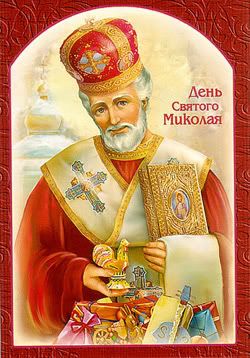 As Mahanoy at Street Prophets reminded us last night, today is the St. Nicholas Day. There are some stories about St. Nicholas on the Saint Nicholas Center web site. Tonight, at Advent candle time, I think I'll encourage the kids to think about how the stories can be "true on the inside"--what message these stories might have for us today. Through the centuries many stories and legends have been told of St. Nicholas' life and deeds. These accounts help us understand his extraordinary character and why he is so beloved and revered as protector and helper of those in need.More here. The image of Saint Nicholas seen above is from the gallery on the Saint Nicholas Center web site. Alternate link for comments |
Posted by
Renee in Ohio
at
3:15 PM
|
![]()
Tuesday, December 05, 2006
Advent, continued
After yesterday's post about Advent, I was inspired to create this card. I'm still looking for suggestions of poems, songs, or other short pieces of writing that would be suitable for reflection along with our Advent candle lighting. I'd like to find a few things that are more generally invocative of the *themes* of Advent, but without the overtly religious language, in order to make it more accessible to my son, who is not a believer. (But I convinced him to come "along for the ride", by plying him with the little candies in the Advent calendar.) Alternate link for comments |
Posted by
Renee in Ohio
at
11:09 AM
|
![]()
Monday, December 04, 2006
Taking time for pondering
So, Christmas is coming again, huh? I was just remarking to my EfM group last night that I don't think I've experienced a single Christmas where I wasn't either a teacher or a student. Or if I did, I was probably a very new parent at the time. So at the time when I hear others talking about how they've done *all* their shopping already, or are at very least finishing it up, I'm in the midst of end-of-the-quarter/semester frenzy. "Soon..." I will quietly reassure myself. "Soon, I will be finished with what I'm working on, and will be able to turn my attention to the holidays." Light one candle for hope, One bright candle for hope.Whether or not you believe that the biblical story of Jesus "really happened", there is something universal about the "hope in a dark time" theme at this time of year. That's one of the things I said last night as we lit the first candle on our makeshift Advent wreath. And I read part of the nativity story in Luke, emphasizing this verse: But Mary treasured all these things, pondering them in her heart.And I said, whatever we believe, or don't believe, I think it's important at this busy, sometimes sensory-overloading time of year, to take time to ponder.  By the way, the quarter is *not* yet over--I still have to put finishing touches on an exam and grade some papers today. And I guess I need to run to the grocery store, because Demetrius is on a tight deadline and probably won't be able to get out. So I don't know yet what poem or song or piece of writing we will be pondering when we light our candle tonight, and am open to suggestions. ;) Update: Via Father Jake Stops the World, a Meditation for Advent I. The song is "Quiet", by Paul Simon. I've also really been appreciating (since discovering them only yesterday) the reflections of Sr. Claire Joy on her blog Flavor of the Month. Alternate link for comments |
Posted by
Renee in Ohio
at
11:09 AM
|
![]()
Sunday, November 26, 2006
Bishop Gene Robinson on wedge issues as distractions
This is the third part of my transcription of Bishop Gene Robinson's talk at the Center for American Progress, when the host started to ask him some questions. |
Posted by
Renee in Ohio
at
6:23 PM
|
![]()
Links to check out
Just found out about this site--actually, I'd probably heard about it before and forgot about it--and thought I'd share. |
Posted by
Renee in Ohio
at
1:47 PM
|
![]()
Gene Robinson on understanding what his opponents fear
Part II of Bishop Gene Robinson's talk at the Center for American Progress... Alternate link for comments |
Posted by
Renee in Ohio
at
12:40 AM
|
![]()
Thursday, November 23, 2006
Gene Robinson on "Justice and the Common Good"
The following is from a talk by Gene Robinson to the Center for American Progress, on the topic of Working for Justice and the Common Good. It took place on the third anniversary of his becoming the bishop of New Hampshire. Initially, I was thinking I would just try to summarize it, but there is a lot of good stuff here, so I ended up largely transcribing about the first third of it. Will share more in a future post, and in the some of the parts toward the end of the talk/interview, I'll have more of my own thoughts to share. In Mark, Jesus seems to be figuring it out as he goes along--which to Gene makes sense, because if God chose to live a completely human life, we don't know what's going to happen an hour from now. "And I think that's how Jesus lived his life, so, as you read Mark's Gospel, you can begin to see Jesus kind of putting all this together in his mind...I think Mark's Gospel gives us an idea of the development of Jesus' self-understanding.Gene goes on to set the stage for telling a story that Robinson sees as a turning point in Jesus' self understanding. "Jesus is, of course, always in trouble, especially with the religious types. ... So Jesus was really fed up to here with all this, and he goes on vacation. Well, it doesn't actually say that. It says he went into a foreign country--into Tyre, which is in modern day Syria. It does say that he didn't want anybody to know he was there, he didn't want anybody to know his name (which I can perfectly understand these days!) He just wanted a little peace and quiet. Robinson goes on to tell about a book by Ron Heifetz called Leadership Without Easy Answers, in which the author says that leadership in today's culture is really about holding the hand of the organization, the people in the organization, and assuring them that we're going to live through this. That's the primary role of the leader is to lower the anxiety level of the institution enough so that they can get their work done. Because if they're highly anxious, if they're worried about survival, they're not going to be about their mission, because they're going to be all about survival.
More to come. You can listen to the streaming audio here. |
Posted by
Renee in Ohio
at
11:43 PM
|
![]()
Saturday, November 04, 2006
Katharine Jefferts Schori's Investiture Sermon
This morning, beginning at 11 a.m., I watched Katharine Jefferts Schori's investiture online via streaming video. This is the first such service I have ever witnessed, and I found it quite moving and hope-inspiring. At several points during the service I grabbed screen captures, which I hoped to share along with the transcript of her sermon. Unfortunately, the screen capture software, which has worked beautifully for me in the past, yielded nothing but all-black images. This is disappointing, because I had gone to the trouble of capturing some great shots, like the one of KJS knocking on the door with her staff at the beginning of the ceremony, shots of her with the outgoing Presiding Bishop, Frank Griswold, an pictures of the banners, choir, liturgical dancer...the list goes on. I hope there will be pictures of the event somewhere--possibly in the photo galleries of her official web page. In Death of the Hired Man, Robert Frost said that "home is the place where, when you go there, they have to take you in." We all ache for a community that will take us in, with all our warts and quirks and petty meannesses – and yet they still celebrate when they see us coming! That vision of homegoing and homecoming that underlies our deepest spiritual yearnings is also the job assignment each one of us gets in baptism – go home, and while you're at it, help to build a home for everyone else on earth. For none of us can truly find our rest in God until all of our brothers and sisters have also been welcomed home like the prodigal. Alternate link for comments |
Posted by
Renee in Ohio
at
2:50 PM
|
![]()
Wednesday, November 01, 2006
Shalom from Bishop Katharine
This Saturday, November 4, marks the investiture of Katharine Jefferts Schori as the 26th Presiding Bishop of the Episcopal Church. The ceremony will be viewable via webcast. The following bulletin insert is going out for use at services this Sunday. |
Posted by
Renee in Ohio
at
2:18 PM
|
![]()
Monday, October 30, 2006
Alex P. Keaton returns to Columbus
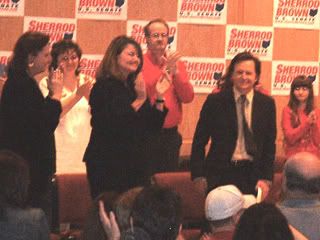 Demetrius and I first moved to Columbus (to attend graduate school) at around the time the 80s sitcom Family Ties was wrapping up its seven year run. I remember our new neighbors telling us that the show supposedly took place in Columbus, Ohio, and that local stores like Lazarus (now Macy's) made sure that the characters could be seen carrying shopping bags bearing their names and logos. That little factoid had slipped my mind until I read at Pho's Akron Pages that Michael would be coming to Columbus today for an event with Sherrod Brown. Thanks to my incredibly patient husband being willing to come with me (I *hate* trying to parallel park), I was not only able to attend the event, but this time I've actually got pictures. Actually, the reason I asked Demetrius to come along was because of the event's timing. When I first RSVP'd via Sherrod Brown's campaign site, it looked like the event would be from 11 to 12, so I was just planning to go to the event on my own once D came back from dropping Daughter in Ohio off at school. Then I got a reminder about the event saying that it was at 10 to 11, and it made a lot more sense to just go together after dropping Daughter off at school. We arrived at about quarter to 10 at the building housing Ohio State University's Moritz College of Law. We found a parking meter with a two hour time limit, but that seemed like it would be plenty of time. Nearly an hour and a half later, it was clear that it was *not* enough time, as Michael J. Fox and Sherrod Brown had not yet taken the stage. Demetrius had to run out to move the car and pump more money into the meter, thankfully getting back just as the program began. I was actually concerned that he might not be allowed back in, as the event was packed, with plenty of people who had been unable to find seats in the auditorium standing near the door. There were also bits of commotion from time to time as people in wheelchairs tried to get situated in the audience. Turns out there was a section in the back of the auditorium that was labeled as reserved seating for people with disabilities.  But camera from the news had set up there. 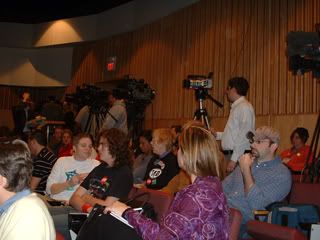 One of the women sitting behind us said that the law building had been constructed before current accessibility standards were put in place. Professor Colker, who is a specialist in disability law, had used money from an award she won to pay for that seating area, and that she'd be furious to see what happened today. There was also this guy wearing a shirt with the word REPUBLICAN in large letters on the front, who was clearly amused by the situation, and we wondered if and where he was planning to blog about it. Once the program finally got under way, it moved along very quickly. We heard first from Dr. Wendy Macklin about the need for new sources of stem cells for research. She explained that stem cells come from the inner cell mass of blastocysts which are about 150 cell embryos, generated in in vitro fertilization clinics. Of the many embryos generated in these clinics, some will result in pregnancies, but many won't. Those that are not used sit in liquid nitrogen for sometimes years. In the past, these have been used to generate cell lines. We can use cells that were generated as cell lines before August of 2001. Initially there were about 22 cell lines, and of those, only a small number are usable, and those have been grown on mouse feeder cells in a variety of ways. Those are not likely to be useful for tranplantation in any way. Dr. Macklin said that even though getting new lines of stem cells would be unlikely to lead to a cure for any given disease immediately, it would be a huge boon to this area of research. For just one example, it would allow us to investigate how to "tweak" cells in the nervous system in other parts of the body that have been degenerating from a particular disease. There were a number of people on the stage who were suffering from some type of disease or disability that could potentially benefit from stem cell research. Only one of them was scheduled to speak, but Sherrod Brown made a point of acknowledging the children by name. That was a nice gesture because, as tired as I had been getting of sitting and waiting for this event to begin, I could only imagine how restless the children were getting by the time things finally started. 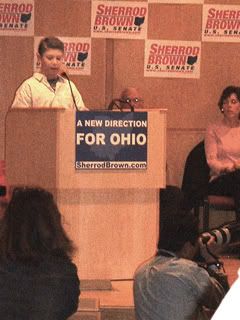 After Wendy Macklin, we heard from Tanner Barton, an 11 year old boy from central Ohio talked about juvenile diabetes and how it affects his daily life. He's in 6th grade and is a competetive gymnast and swimmer. He went on to detail what is involved in constantly checking and maintaining the right blood sugar/insulin balance. The constant need for monitoring sometimes disrupted his practices and made him wary about sleeping away from home. He also related a recent experience that made him realize that he must be sure to get up early on days when he has an exam--so that he can have enough time between breakfast and exam time for his blood sugar to reach the optimal level. 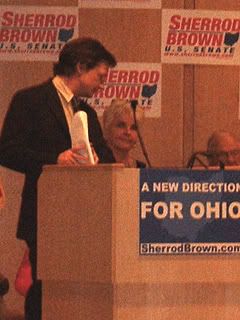 Finally, it was Michael J. Fox's turn to take the stage. He started by saying that we need people like Sherrod Brown in Washington, so that science can reclaim its place in American society. It's part of what makes us great, along with our love and compassion for our citizens, and the desire to do the best thing for them. He thanked Tanner for sharing his experience with diabetes and said that it must be important for a guy his age to tell people what his life was like. Fox said, "Guess what? That doesn't change." At 45, you still want to share what your experience is like--it's a natural instinct. Michael congratulated Tanner on the beautiful job he did speaking about living with diabetes, adding, "I will use you as an inspiration." Michael said that "this is kind of a coming home for me in a weird way", because Columbus is the home of Alex P. Keaton from Family Ties. He commented that he was recently asked what his character (a conservative teen who admired Ronald Reagan) would think of him campaigning for stem cell research. Michael quipped, "First of all, he'd be happy I'm wearing a tie..." and added that he thinks Alex would say it's the right thing to do. Sherrod Brown voting for the stem cell research enhancement act--to expand federal funding of stem cell reasearch--was the right thing to do--but Mike DeWine voted against it. He said, "A vote for Sherrod Brown is a vote for hope of a better quality of life for millions of Americans." Michael noted, as he has recently on television, that he is supporting candidates who support all stem cell research (regardless of party) Limiting this research is short-sighted, and Michael said that he has every confidence that research will improve the lives of people suffering from numerous diseases. The majority of the House and the Senate, and over 70% of Americans supported expanding funding for stem cell research, but Mike DeWine sided with President Bush in voting against potentially life-saving research. Sherrod Brown will stand on the side of hope, supporting stem cell research in the Senate as he has in the House of Representatives. He went on to comment on the Limbaugh flap. "This past week I had a little run-in with some less-than-compassionate conservatives. I guess I'm not supposed to speak with you until my symptoms go away--or maybe I'm just supposed to go away." But he said that he's not going to go away, and neither are the millions of Americans and their families who live with debilitating diseases. We're going to make the diseases go away with the support of people like Sherrod Brown. Michael J. Fox: I'm asking you to stand up for America's continued leadership in health, science, and medicine, and what is right for the hundreds of millions of Americans who have or are touched by debilitating diseases. Bush and DeWine's policies have been a rejection of the promising future of medical science. "Well, forgive me for this, but it's time we 'get back to our future'!" This was greeted with laughter and applause for Michael, who received at least two standing ovations during his brief appearance on state. He ended by asking those in attendance to please vote for Sherrod Brown for Senate. It was a very moving experience to see Michael J. Fox speaking to a packed auditorium about this difficult issue. It also made me have some rather uncharitable thoughts about Rush Limbaugh needing a visit from the Karma Fairy. Heck, *I* don't want to be seen in public if I'm feeling under the weather and not happy with the way I look. I can scarcely imagine the courage it would take to appear on camera, on stage, while not having the level of control over my nervous system that most of us take for granted. Especially someone who has been in show business--I would think that makes one more image conscious than the average person. Michael J. Fox certainly *could* have chosen to live a private life with his family and friends, far from television cameras, not subjecting himself to the mockery and asinine speculations of the likes of Rush Limbaugh. There is no guarantee that expanded stem cell research would benefit him personally. I admire his courage in speaking out so publicly on this issue, and doubt I could ever be nearly that courageous myself, were I in his situation. I'm almost positive that Mr. Limbaugh couldn't. Alternate link for comments |
Posted by
Renee in Ohio
at
2:07 PM
|
![]()
Saturday, October 28, 2006
Samhain: A space for remembrance
Another post about Samhain from Street Prophets, this one by Alexandra Lynch. Samhain is one of the single most misunderstood holidays in the Wiccan calendar by outsiders. It is simultaneously many Witches' favorite. It is certainly one of the key holidays for us. So what's going on here? Click here for the rest. Alternate link for comments |
Posted by
Renee in Ohio
at
2:12 AM
|
![]()
Wednesday, October 25, 2006
David Korten, Part 3
The day of reckoning for our reckless ways is now at hand, as we face the mounting forces of a perfect economic storm, born of a convergence of peak oil, climate change, and a meltdown of the U.S. dollar. Peak oil of course occurs when global oil production peaks and begins its inexorable decline, in the face of continued rising global demand, sending prices soaring. Now, some experts believe that peak oil occurred last year in 2005, others believe it will not occur for another 10, 20, or even 35 years. Fortune Magazine correctly notes that the difference in those estimates is irrelevant. The era of peak oil is over, and we must act immediately to end our dependence on oil. |
Posted by
Renee in Ohio
at
1:47 PM
|
![]()
David Korten on how we measure wealth
This is a continuation of my transcript of David Korten's talk in Columbus on October 14. Part 1 can be seen here. |
Posted by
Renee in Ohio
at
12:09 PM
|
![]()
Saturday, October 21, 2006
Paganism
Interesting post--this is one of the faith traditions I recognize that I don't know as much about as I should. |
Posted by
Renee in Ohio
at
7:16 PM
|
![]()
Friday, October 20, 2006
David Korten in Columbus, October 14, 2006
This is the beginning of my transcription of David Korten's remarks at the Earth Charter Summit that took place in Columbus, Ohio on Saturday, October 14. David Korten: It is such a joy to be here in Ohio with such a great group of people --I've just been meeting extraordinary activists everywhere I go. And, I hope you'll excuse me if I just take a moment here to go shake hands with Granny D (laughter and applause). Granny D is such an inspiration, when I was facing my 65th birthday and thinking, "Well, you know, this is kind of a transition. I guess the rest of my life I should be starting to think about winding down and passing on the responsibilities." (Laughter) And Granny D of course is an extraordinary example of what we should all be doing with our elder years. She's a great inspiration.
The key to this is positive. As was mentioned in the introduction, one of the things I've come to is resistance alone is a losing strategy. Ultimately, to win we must come forward to create the positive. And then of course the fourth, and absolutely foundational element of this quadrangle is the Voting Rights Revival Conference. And of course Ohio here reminded us all that, among all the democratic reforms we need, it starts with counting the votes. Absolutely foundational. So, I congratulate you all on your work, and thank you for the invitation. I hope my comments today will help put the work you're doing in a deeper historical, cultural, and to some extent spiritual context. Now, the underlying message of the Great Turning is quite straightforward. We humans have come to the end of a long and deeply destructive era. It is time to turn this world around for our own sake, and for the sake of our children for generations to come. There's good news and bad news, and it comes in the same package. The news is "business as usual is over". Peak oil, climate change, the collapsing U.S. dollar, and spreading social disinigration born of the marginalization of the majority of humanity are coming together in a constellation of forces desined to fundamentally change every aspect of modern life. Now, whether this convergence of forces plays out as an epic human opportunity or the final human tragedy, will depend on the stories by which we understand what's happening, and undrestand the choices that it is ours to make. And I'm going to be talking about those choices.
|
Posted by
Renee in Ohio
at
4:13 PM
|
![]()
Saturday, October 14, 2006
The Great Unraveling vs. The Great Turning
Some of you may remember me posting about The Great Turning in the past couple years, and linking to Joanna Macy's web site. Today, as I mentioned here, I attended an Earth Charter Summit, where the featured speaker, David Korten was discussing his recent book entitled The Great Turning: from Empire to Earth Community. (He is also the author of When Corporations Rule the World.) The event took place at an SGI Community Center, which is worship center for people who practice Nichiren Buddhism in the Columbus area. I didn't know that before I got there--figured it was just another community rec center when I first walked in. But all the bowls and cushions tipped me off that there might be some Buddhist practice going on there. It will probably take me a while to get this written up, but I can at least give some highlights now. We started by watching two films, A Quiet Revolution and Another Way of Seeing Things. Before the David Korten spoke, awards were given--they called them "Recognition with Gratitude". Cindy and Art Strauss, who attend my church, were recognized for their work with Simply Living. I don't see Art at church much because he has had various health problems, but he was a regular at peace rallies a couple years ago, and always brought handouts to help educate people about various issues. I think it was Art who first introduced me to Jim Hightower's writing via the Hightower Lowdown. Art is now in a wheel chair, having broken his hip--I wasn't aware of that until today. So Cindy wheeled him up to the front of the room, and he accepted the plaque with tears in his eyes and a catch in his voice, saying that he didn't deserve it, but that it belonged to everyone who had worked with them. Art and Cindy are some of the people whose example reminds me that I have no business being "too tired" to keep plugging along, trying to help make the world a better place. Another such person would be Granny D. She was there today as well--attending the event because she was in town to speak at the Voting Rights Revival Conference this evening. And since she is currently reading David Korten's book, she wanted to hear him speak. I will have to write up David's talk a little later, but much of the basic premise can be found in this article in Yes Magazine. By what name will future generations know our time? Click here to read more. Alternate link for comments |
Posted by
Renee in Ohio
at
11:58 AM
|
![]()




